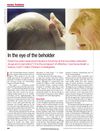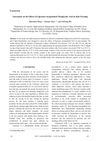November 2024 in “Skin Appendage Disorders” Start low-dose minoxidil gradually, especially for women, to reduce side effects.
 February 2024 in “Cosmoderma”
February 2024 in “Cosmoderma” Low-dose oral minoxidil can help treat male and female pattern hair loss, especially in those who can't use topical treatments or have heart health issues.
 August 2023 in “Aesthetic Plastic Surgery”
August 2023 in “Aesthetic Plastic Surgery” Platelet-rich plasma therapy helps increase hair density in male patients with hair loss but doesn't change hair thickness.
 January 2024 in “Cosmetics”
January 2024 in “Cosmetics” HAIR & SCALP COMPLEX may help treat hair loss by stimulating hair growth and restarting the hair cycle.
 83 citations,
April 1992 in “Clinical Endocrinology”
83 citations,
April 1992 in “Clinical Endocrinology” Having enough iron improves the effectiveness of a specific hair loss treatment in women.
 14 citations,
May 2011 in “Drug Metabolism and Disposition”
14 citations,
May 2011 in “Drug Metabolism and Disposition” Ketoconazole increases finasteride's effectiveness and lifespan in the body.
 13 citations,
May 2020 in “Journal of Plastic Reconstructive and Aesthetic Surgery”
13 citations,
May 2020 in “Journal of Plastic Reconstructive and Aesthetic Surgery” Botulinum toxin's effectiveness for treating scalp alopecia is not well-supported due to insufficient data.
 12 citations,
January 2011 in “Dermatologic Surgery”
12 citations,
January 2011 in “Dermatologic Surgery” Retinoids can prevent skin cancer in high-risk people but have side effects and require more research on dosing and effectiveness.
 9 citations,
July 2020 in “Biomedicine & Pharmacotherapy”
9 citations,
July 2020 in “Biomedicine & Pharmacotherapy” Mitochondrial therapy and platelet-rich plasma therapy both stimulated hair regrowth in aging mice, with mitochondrial therapy showing similar effectiveness to plasma therapy.
 8 citations,
January 2018 in “PubMed”
8 citations,
January 2018 in “PubMed” Smaller finasteride particles increase effectiveness in treating hair loss.
 8 citations,
August 2011 in “Journal of Pharmacology and Experimental Therapeutics”
8 citations,
August 2011 in “Journal of Pharmacology and Experimental Therapeutics” Dosing time affects finasteride's effectiveness and safety in rats.
2 citations,
January 2022 in “Skin appendage disorders” Low-dose oral minoxidil effectively promotes hair growth but has associated risks.
 95 citations,
April 2013 in “PLOS ONE”
95 citations,
April 2013 in “PLOS ONE” Ginseng is possibly safe but its effectiveness is unclear due to poor quality studies and mixed results.
 61 citations,
May 2007 in “Journal of Pharmaceutical Sciences”
61 citations,
May 2007 in “Journal of Pharmaceutical Sciences” Different forms of hair loss drug can improve effectiveness.
 29 citations,
March 1983 in “Journal of The American Academy of Dermatology”
29 citations,
March 1983 in “Journal of The American Academy of Dermatology” New treatments for psoriasis have improved effectiveness and may reduce long-term side effects when combined with standard therapies.
 28 citations,
August 2003 in “Nature”
28 citations,
August 2003 in “Nature” Cosmeceuticals may have potential but their effectiveness and market success are still uncertain.
 17 citations,
June 2021 in “Molecules”
17 citations,
June 2021 in “Molecules” Melatonin-loaded nanocarriers improve melatonin delivery and effectiveness for various medical treatments.
 14 citations,
January 2015 in “Current problems in dermatology”
14 citations,
January 2015 in “Current problems in dermatology” Female pattern hair loss treatments vary in effectiveness and may have side effects.
 3 citations,
February 2021 in “Molecules”
3 citations,
February 2021 in “Molecules” A new method was created to test the effectiveness of Dihydrotestosterone (DHT) inhibitors, like finasteride and dutasteride, in human and fish cells. The results showed fish cells are more sensitive to these treatments, and dutasteride works better than finasteride in all tested cells.
 2 citations,
July 2010 in “Clinical and Experimental Dermatology”
2 citations,
July 2010 in “Clinical and Experimental Dermatology” Delaying hair loss treatment reduces its effectiveness.
 October 2024 in “A I Burnasyan Federal Medical Biophysical Center Clinical Bulletin”
October 2024 in “A I Burnasyan Federal Medical Biophysical Center Clinical Bulletin” Various treatments effectively manage androgenetic alopecia.
 January 2024 in “Archives of dermatological research”
January 2024 in “Archives of dermatological research” Both treatments for alopecia areata showed similar modest effectiveness.
 January 2014 in “Sen i Gakkaishi”
January 2014 in “Sen i Gakkaishi” Liposome-encapsulated thioglycolic acid improves hair perming effectiveness and durability.

PEGylated liposomal doxorubicin improves cancer treatment effectiveness and reduces side effects like heart damage and hair loss.
July 2016 in “Biometrics & Biostatistics International Journal” New guidelines using video aim to ensure honest reporting of hair loss treatments.
 March 2018 in “John Wiley & Sons, Ltd eBooks”
March 2018 in “John Wiley & Sons, Ltd eBooks” Surgical therapies for vitiligo vary in effectiveness, with combination therapy and medical tattooing recommended for better results.
 68 citations,
January 2007 in “Journal of Cosmetic and Laser Therapy”
68 citations,
January 2007 in “Journal of Cosmetic and Laser Therapy” Laser/light treatments for hair loss are popular but lack scientific data proving effectiveness.
 41 citations,
September 2018 in “Australasian journal of dermatology”
41 citations,
September 2018 in “Australasian journal of dermatology” No systemic treatment for alopecia areata has strong evidence of effectiveness.
























